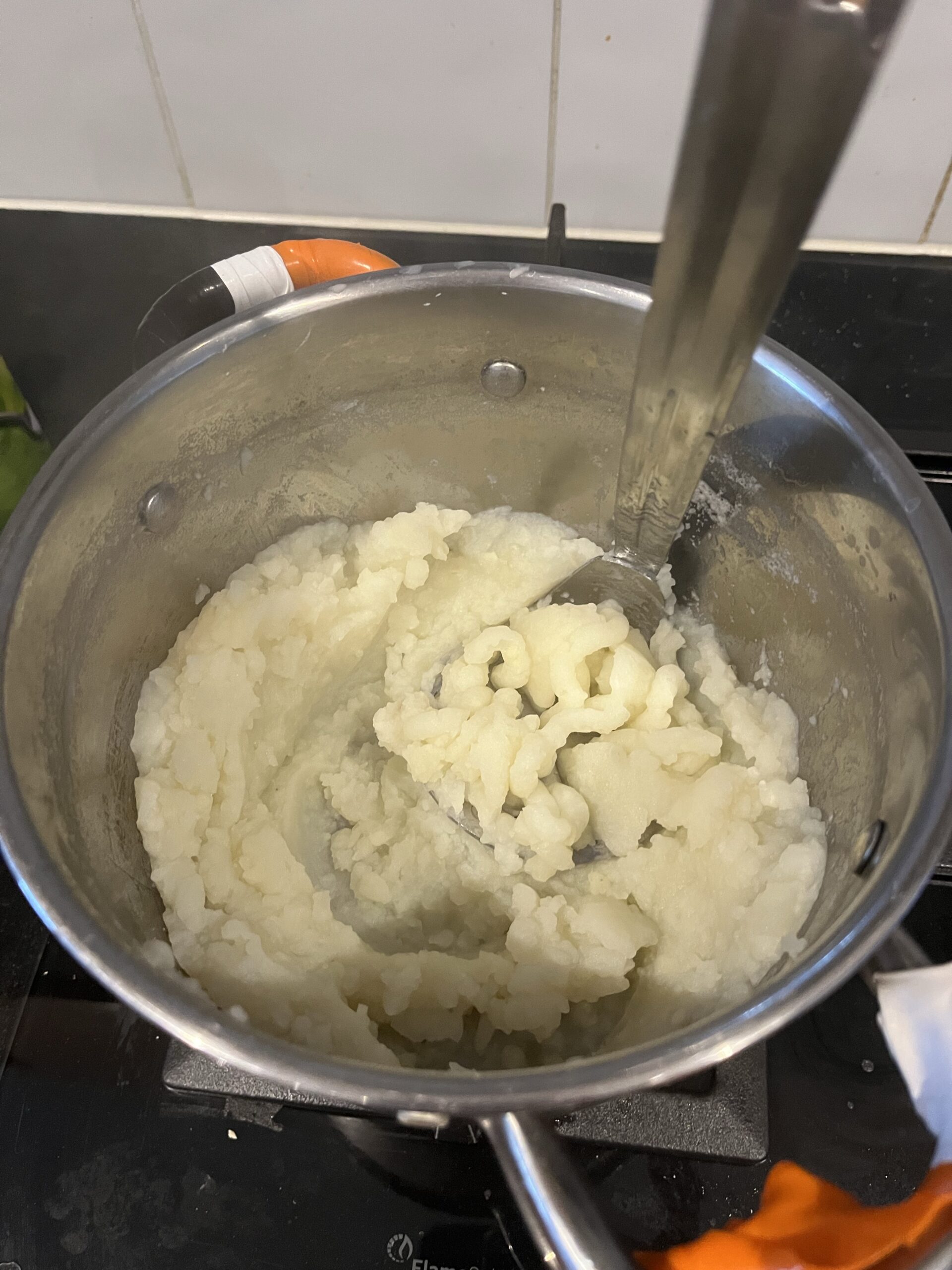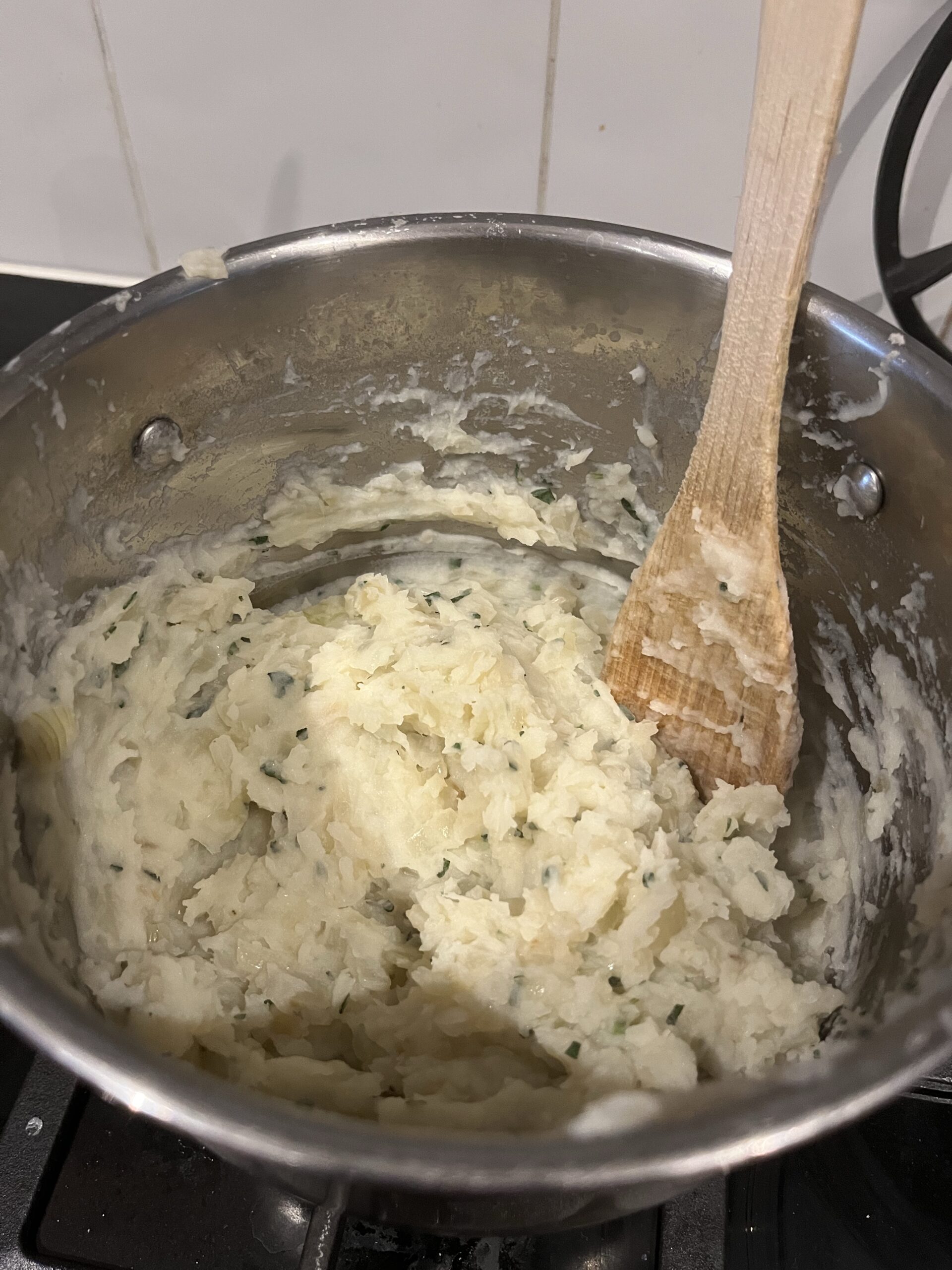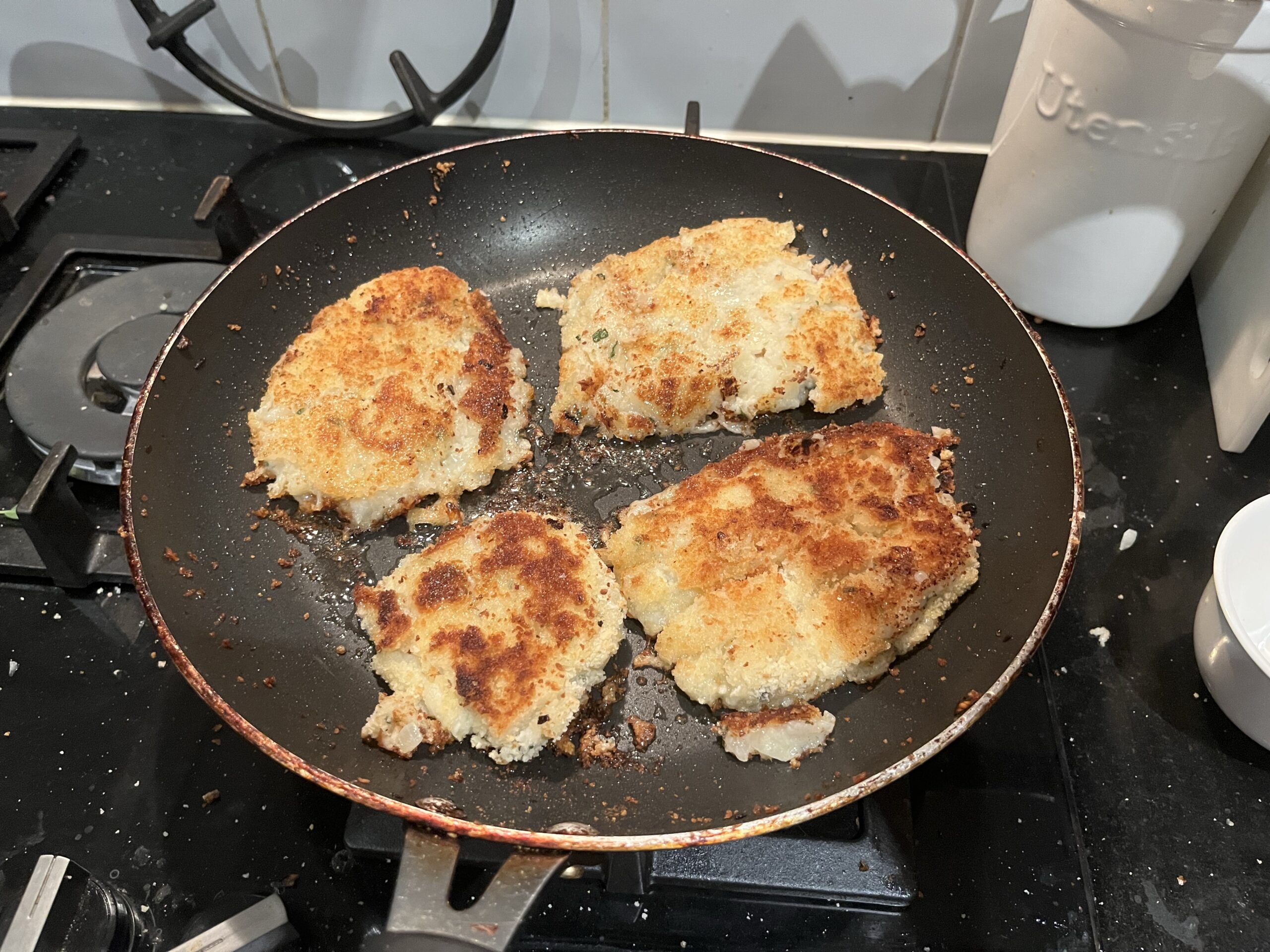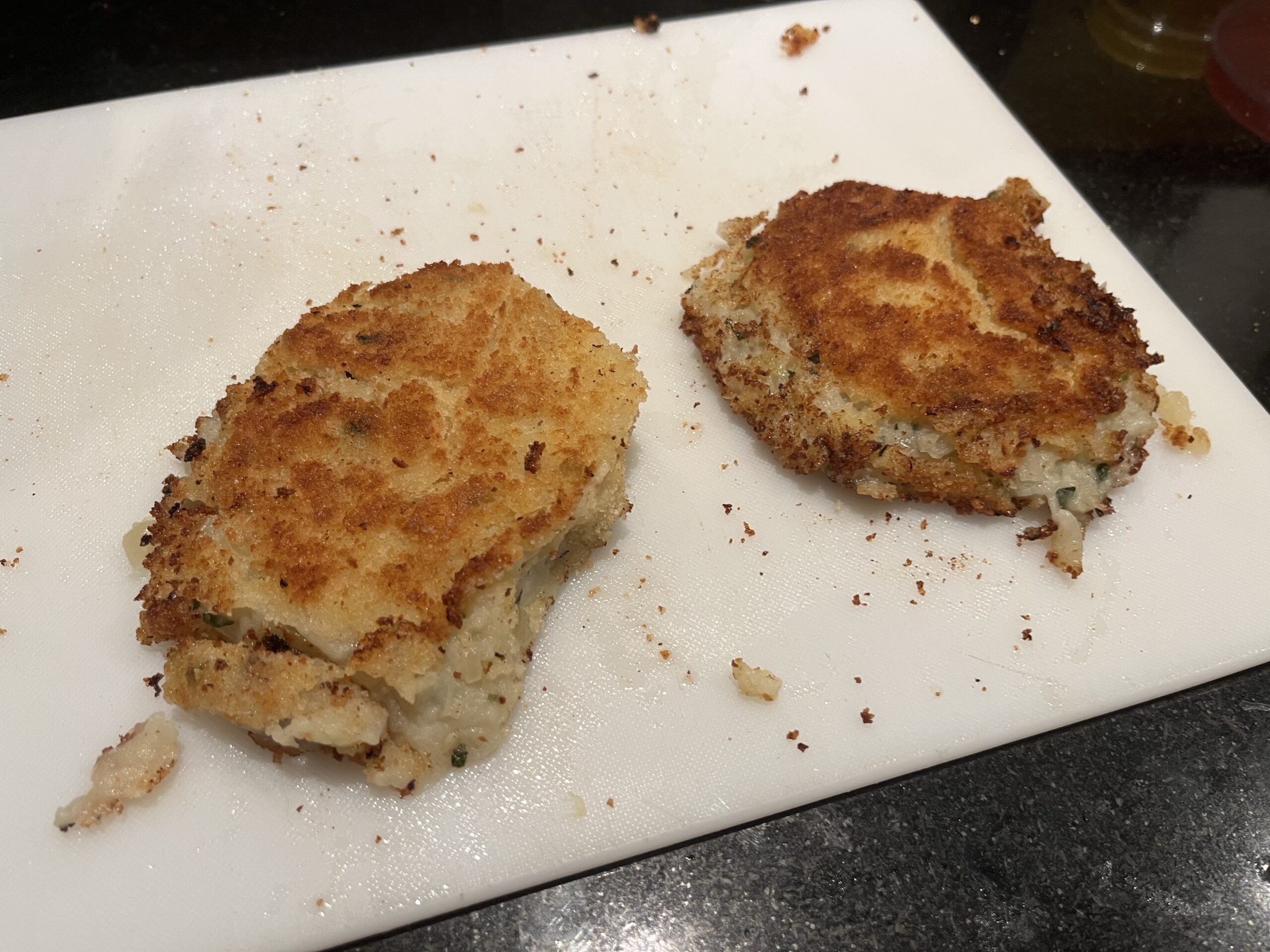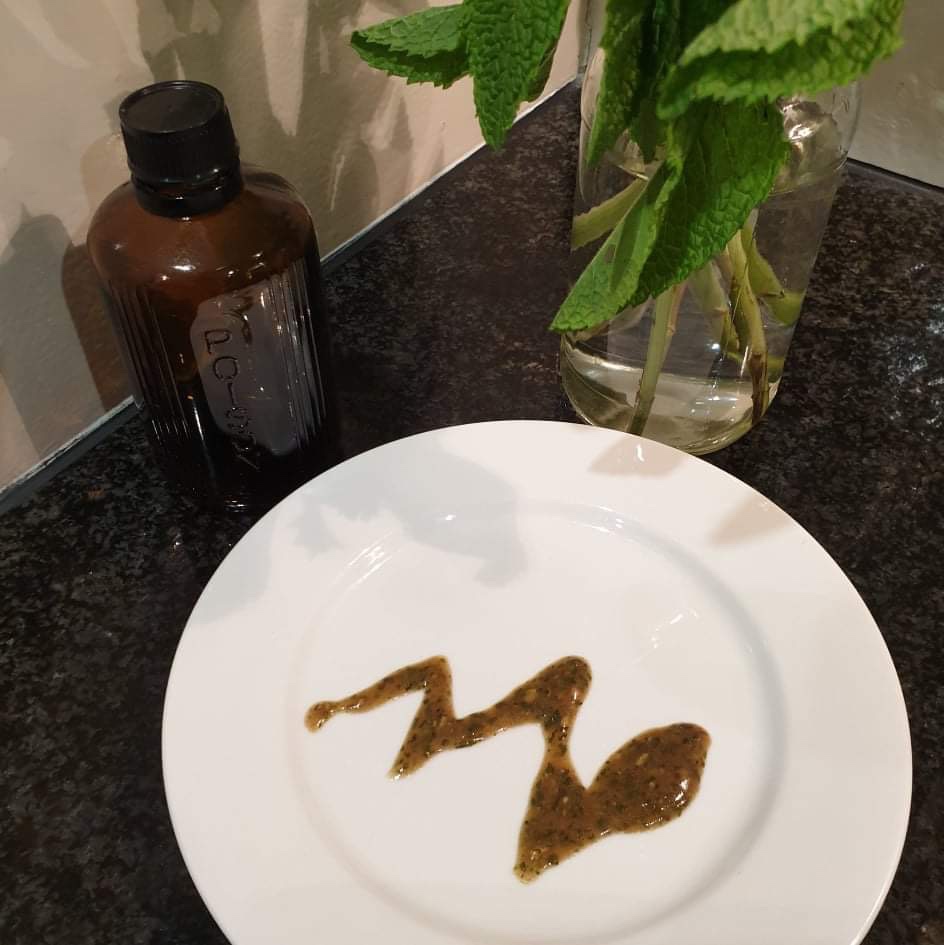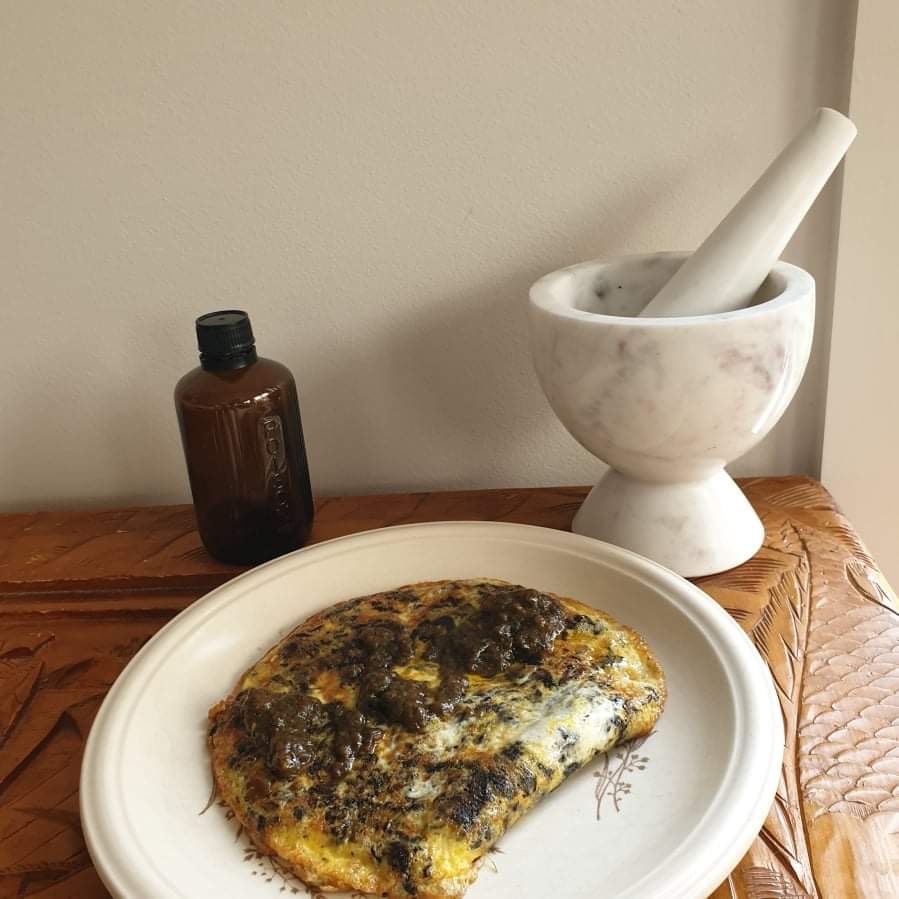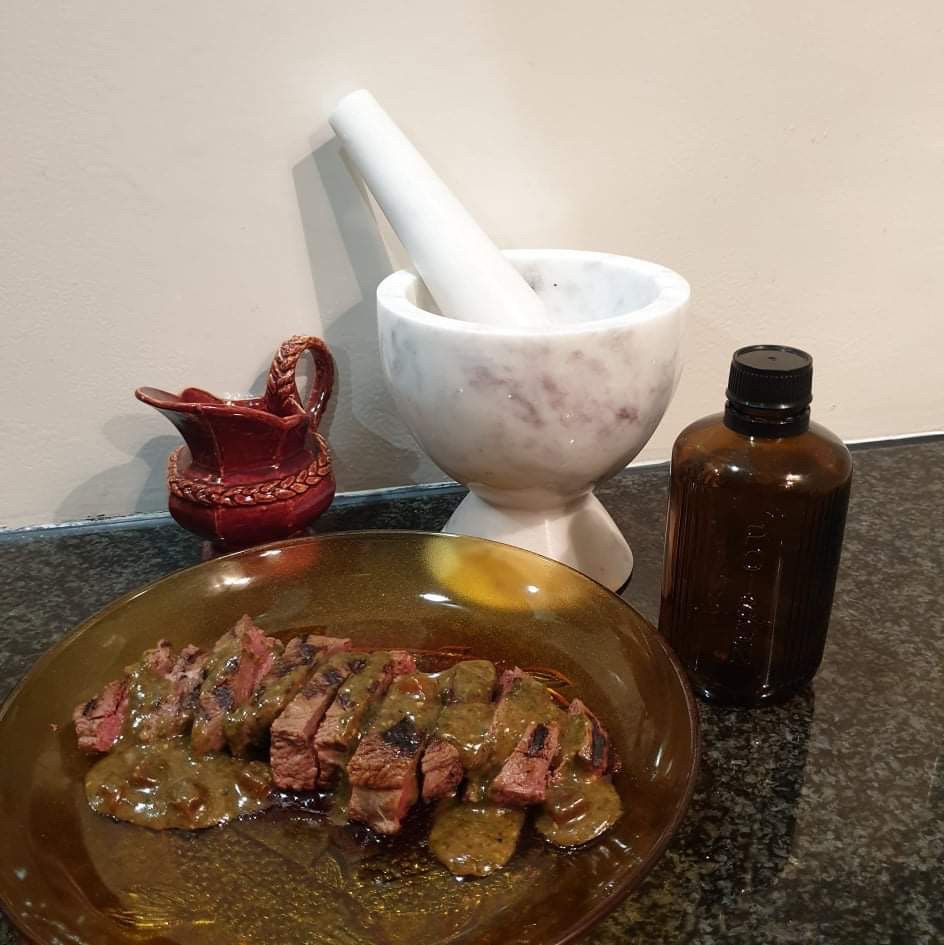These are the episode notes and errata for Pratchat episode 50, “Salt Rat Arsenic Heat“, featuring guest Cal Wilson, discussing the 1999 Discworld companion book, “Nanny Ogg’s Cookbook“, by Terry Pratchett, Stephen Briggs and Tina Hannan, and illustrated by Paul Kidby.
Iconographic Evidence
To prove we really did cook these things, here are some photos! Be warned: the last one is not for the faint of heart…
Notes and Errata
- The episode title is reference to the famous 2017 cookbook Salt Fat Acid Heat: Mastering the Elements of Good Cooking, by American chef Samin Nosrat. Nosrat also had a Netflix cooking show of the same name, which appeared in 2018. We’re sure you’ll work out how the rat comes into it, but we may not have mentioned Lord Downey’s contribution to the book: a recipe for mint humbugs which includes the ingredient “arsenic to taste”…
- Cal’s previous episodes were #Pratchat1, “Boots Theory” from November 2017 and #Pratchat3, “You’re a Wizzard, Rincewind” from January 2018.
- Cal’s Tiktok username is @calbowilson; look for the hashtag #baristacats.
- To avoid any confusion:
- The “Baristacats” are Cal’s cats, Pirate and Barnacle, who like to sit on top of the coffee machine in her kitchen, leading her to create a series of videos in which she tries and fails to get them to serve her coffee.
- The Aristocats (1970, dir. Wolfgang Reitherman) is a Disney animated musical about a family of aristocratic cats who get into trouble and must turn to an alley cat and his friends for help.
- “The Aristocrats” is a famous dirty joke in which a family of performers try to get a job by describing to a theatre manager the incredibly depraved and taboo-breaking things they do in their performance – usually a long list, improvised by the comedian – before being asked the name of the act; they respond with “The Aristocrats!” While it dates back to the vaudeville era, it continues to be popular in private among American comedians, with the point being to improvise the most transgressive and offensive description of the act. It was the subject of a documentary film in 2005, The Aristocrats, directed by Penn Jillette and Paul Provenza.
- Liz’s cats are named after Isaac Asimov and Aldous Huxley. There have been recent prestige television adaptations of their best-known works: Asimov’s Foundation for Apple TV+ in 2021, and Huxley’s Brave New World for the NBC streaming service Peacock in 2020. Brave New World was cancelled after the first season, but Foundation is getting a second season.
- The Great British Bake Off – known as The Great British Baking Show in the US – is an extremely wholesome reality television show that started in 2010. Contestants are (usually amateur) bakers, who compete in a series of challenges to impress a panel of judges, all for the glory of being crowned the best baker (there’s no prize money). It’s produced by Love Productions, originally for the BBC, where it grew to be so successful on BBC Two that it was moved to BBC One. Despite commissioning Love Productions to make other shows about sewing and pottery using the same format, the BBC made an in-house program about hair styling, Hair, in 2014. This led to a legal dispute over copyright that eventually led to Love Productions taking the show to Channel 4, where it’s been since 2017. Many countries have their own version, including Australia.
- Bridgerton is a 2021 Regency-era period drama made for Netflix, adapted from the Bridgerton novels by American author Julia Quinn. It’s known for its racy sex scenes. We previously mentioned it in #Pratchat41, “The Adventures of Crab Boy and Trouser Girl“.
- J H C Goatberger – publisher of the Disc-famous Almanack – and his chief printer Mr Cropper both appear in Maskerade. We discussed it in #Pratchat23, “The Music of the Nitt“.
- The Encyclopædia Britannica is probably the most famous English-language encyclopaedia, which is a compendium of knowledge. The Britannica was first printed in 1768 in the United Kingdom, and most of its editions span multiple large volumes. In 1901 it was taken over by American managers, who shortened and simplified its language and began selling it via door-to-door salesmen. It still exists, though the last print edition was published in 2012; it’s now exclusively online at britannica.com.
- Where Did I Come From? is the 1973 classic children’s book about sex and reproduction. It was originally subtitled “The Facts of Life Without Any Nonsense and with Illustrations”, and is the first of many similar books by Peter Mayle, an English businessman who became an advertising copywriter and then author. Mayle went on to write the Wicked Willie series of risqué cartoon books about a talking penis, which might sound familiar: they were illustrated by Gray Joliffe, the same person who drew the cats for Pratchett’s The Unadulterated Cat! More about that in #Pratchat22, “The Cat in the Prat“.
- We’re pretty sure the “sexy origami” book mentioned by Cal is 2015’s The Amazing True Story of How Babies Are Made, by Australian cartoonist and illustrator Fiona Katauskas. She was inspired to create it because when having the talk with her own son, she found she was using the same book her parents had used – Where Did I Come From? – and thought it could use an update.
- If you’d like to know about Ken’s underpants area, we recommend this delightful piece from Jezebel, “The Strange, Sad Story of the Ken Doll’s Crotch” from 2019, by Rich Juzwiak.
- In Kevin Smith’s 1999 film Dogma, Alan Rickman does indeed play Metatron, the angel who is the voice of God. If you’re curious to know what his underpants area looks like, there’s a great photo of him showing it off while holding a Ken doll in this piece for Digital Spy in which Kevin Smith pays tribute to Rickman after his death in 2016.
- Ben’s very silly quip here is a reference to Patrick Stewart’s appearance in the Ricky Gervais sitcom Extras. Like all the other big name actors who appeared in cameo roles, he plays a weird parody of himself, who tells Gervais’ main character about his idea for a facial comedy film in which he has the power to make women’s clothes fall off. His refrain is that by the time they put them back on, “It’s too late, I’ve seen everything.“
- The recipe book plagiarism scandal we discuss is about Elizabeth Haigh’s book Makan. Singaporean-born Haigh was a contestant on the 2011 series of reality cooking show MasterChef in the UK; while she didn’t win, the experience cemented her love of cooking and she went on to great success as a chef, even opening her own restaurants, one of which – Pidgin – was awarded a Michelin star in 2017. Her book Makan was published in October 2021, but soon Sharon Wee, author of Growing Up in a Nona Kitchen, made allegations that many passages relating stories of learning to cook from a grandmother were paraphrased or directly taken from her book. Comparisons of passages where posted online by New Zealand cookbook store Cook the Books, and other authors discovered Makan seemed to “borrow” from other other books and recipe blogs too – both in the anecdotes and personal stories, and some of the recipes. You can read more detail about the scandal in this piece from Eater magazine by James Hansen, though it seems no further information has been officially disclosed, pending the outcome of legal action.
- The introductory text that Ben reads at around the 14:30 mark is for the entire fictional book, not just the cookery section as he suggests.
- We discussed Carpe Jugulum in #Pratchat36, “Home Alone, But Vampires“.
- Ben mentioned some cookbooks for other fictional worlds, specifically 2012’s A Feast of Ice and Fire: The Official Game of Thrones Companion Cookbook, 1999’s Star Trek Cookbook – co-written by Ethan Philips in the persona of Neelix, the character he played on Star Trek: Voyager! – and two cookbooks based on Doctor Who. Ben was thinking of the original one from 1985, The Doctor Who Cookbook, but a newer one inspired by the revived series was published in 2016: Doctor Who: The Official Cookbook. It’s worth noting there are plenty of unofficial cookbooks for recipes based on various fictional worlds, too.
- The character Liz mentions from Game of Thrones is Hot Pie, who appears in the second and third novels in the series, A Clash of Kings and A Storm of Swords, and the first four seasons of the television show.
- Schnapps – from the German schnaps – isn’t a specific kind of alcohol. The original German word is used generically for any kind of strong alcoholic drink. In English it usually means one that is flavoured and sweetened with fruit, but there aren’t any rules – it’s sort of the opposite of Champagne.
- The famous English Twitter user who grows big vegetables is 72-year-old ex-butcher Gerald Stratford (@geraldstratfor3). He’s not a farmer, but an avid vegetable gardener, and after amassing a huge following on social media published a book in 2021, Big Veg. You can read of Gerald’s rise to fame in this lovely article from Eater magazine by Jenny G Zhang. [We promise we’re not sponsored by Eater, they just seem to write the best articles about English food-related stuff! – Ben]
- Ben would just like to clarify that when he says Nanny Ogg’s Cookbook is “a real fan’s book” (at around 23:40), he means it’s really a book for fans, not a book that’s for “real fans”. We don’t go in for that sort of gatekeeping around here – and neither did Pratchett, as evidenced by the way that he expressly tells readers where to find out more if they’re lacking context. There’s no wrong way to be a fan, except for hurting other folks with how you go about it.
- Bergholdt Stuttley “Bloody Stupid” Johnson is first mentioned in Men at Arms, as the designer of the gardens surrounding the Patrician’s Palace, which are said to be the “high spot” of his career. His proper given names are revealed in Maskerade, in a footnote about the organs used by the Opera House and University.
- Speaking of B S Johnson, the “pie bird” is indeed a real thing. They’re an evolution of the originally quite dull ceramic pie funnels stuck into pies to allow some of the steam to vent, preventing fruit pies from bubbling over and helping to ensure a crispy crust. In the earlier twentieth century manufacturers started making them in all kinds of animal shapes, though birds were most popular. Read all about the history of pie birds in this article by Baileyberg at Food52. (See? Not all our sources are Eater this month…)
- We also discussed the “humour” genre of books in #Pratchat22, “The Cat in the Prat“, in relation to The Unadulterated Cat. The primer example mentioned by Ben was Real Men Don’t Eat Quiche, though there are thousands to choose from, and they continue to be published, if in smaller numbers. Modern such books are often compilations of social media accounts, like The Midnight Society, the (entirely fictional) minutes of the meetings of of club made up of famous horror, fantasy and sci-fi authors.
- Spotted dick is indeed a real dish, also known as “spotted dog” and “railway cake” (the latter name especially common in Ireland). The English version is a baked pudding made from suet and dried fruit – most often plums, sultanas or raisins – which are the eponymous “spots”. (For more about this, see the Hogswatch Feast bonus episode.)
- Ben did indeed research the various kinds of fat mined in Überwald for #Pratchat40, “The King and the Hole of the King“. You can find his list of them in the episode notes for #Pratchat40.
- Vegetable suet is made from refined vegetable oils. Like animal suet it’s only readily available in the UK, and not all varieties are gluten free, so check the fine print if you’re buying some and that’s a consideration for you. Nigella Lawson’s website also recommends grated vegetable shortening as a substitute; the most easily found form of this in Australia is Copha, which is made from coconut oil. (See the link for instructions on how to grate it.)
- As it turns out, the difference between lamb and mutton varies depending on where you’re from. In the UK sheep meat (and indeed the sheep) is called lamb in its first year, and mutton if the sheep is two or more years old. In Australia, a sheep’s age is measured instead by how many teeth – specifically permanent incisors – it has (or rather had): Australian lamb comes from a sheep with no permanent incisors; mutton is from a sheep with more than two. (Sheep usually grow a pair of new ones each year, so it works out mostly the same.) Meat from sheep in between lamb and mutton age is called “hogget”, though apparently in the UK plenty of “lamb” is actually hogget in disguise – a step down from mutton dressed as lamb, we suppose. Organic and rare breed farmers in England’s North are known to sell hogget, though. Sheep typically live for around ten to twelve years (when not eaten by foxes, wolves or humans), so seventeen year old mutton isn’t something you need to worry about.
- The Discworld mainstay “sausage-inna-bun” first appears alongside its most famous vendor, Cut-Me-Own-Throat Dibbler, in Guards! Guards!, discussed in #Pratchat7A, “The Curious Incident of the Dragon and the Night Watch“. He shows up to hawk food to the crowd watching the hero attempt to slay the dragon, though he never says “sausage-inna-bun”; instead he describes them as “hot sausages”, and shouts “inna bun!” as one of their many attributes. On this occasion he is also selling peanuts and figgins alongside the sausages, all cooked in a tiny frying pan on his tray.
- We previously discussed Bunnings sausages in #Pratchat21, “Memoirs of Agatea“. In brief: a “sausage sizzle” is a traditional way to raise money for charity by selling cheap (and possibly donated) sausages cooked on a barbecue in slices of bread, usually with fried onions and tomato sauce or mustard. It’s common – or it was, in pre-pandemic times – for ubiquitous hardware store chain Bunnings Warehouse to have a sausage sizzle outside its stores, usually in a carpark.
- Roundworld drop scones are not siege ammunition, but rather small pancakes made by dropping a dollop of batter onto a frying pan. Depending on where you grew up in Australia, drop scones might be better known as pikelets. We won’t get into the discussion of what constitutes a “regular” scone, as this varies considerably around the world. (Australian ones are generally similar to English ones, though we have pumpkin and date varieties less popular elsewhere.)
- The French word for bread is indeed pain, but Ben does not pronounce it remotely correctly. The French word uses a neutral vowel sound, not either of the “a” sounds Ben uses. Sorry French speakers.
- We were unable to confirm it, but it does seem that Paul Kidby’s illustrations for Nanny Ogg’s Cookbook are all originals, done for this book. Certainly the ones of the imps and the various dishes don’t appear anywhere else that we know of.
- Malicious compliance is when someone follows instructions given to them to the letter, knowing that it will cause harm or problems. It’s often described as a form of passive-aggression, though it is sometimes used as an effective form of protest against ridiculous or draconian demands from managers or officials.
- “The Sea and Little Fishes” is the third of five published Discworld short stories. We discussed it in #Pratchat39, “All the Fun of the…Fish?” While it does introduce the Witch Trials, and names the scarecrow used for the Cursing “for several hundred years”, no further information about Unlucky Charlie is given; this section is mostly new.
- Carved wooden lovespoons are a tradition that dates back to at least the seventeenth century. Welsh ones may be the most well known, but they’re also found in Germany, Scandanavia and Eastern Europe. While the “Lancre Loveseat” may well be inspired by them, it should also be noted that Nanny lists “Llamedosian spoon” as the appropriate gift for a fifteenth anniversary.
- The tweet advising that women may be “fascinated” by giving them cheese was an image of a page from the 1971 book The Complete Book of Magic and Witchcraft by Kathryn Paulsen. You can read more about the history of cheese in witchcraft in this article from The Conversation, inspired by the original tweet by Gavin Wren, which we’ve included below. (Pratchat would like to note that we do not condone the use of witchcraft or any other kind of coercion when making advances toward folks of any gender.)
- We’ll learn more about the Discworld’s Moon – and Leonard da Quirm – when we cover The Last Hero, but it is considerably closer to the Disc than our Moon is to the Earth. It has to be, as it appears about the same size, but is only about eighty miles (or 130km) across. The Earth’s Moon is over 2,150 miles across (3,475km), and about 238,855 miles (or 384,400km) away, so for the Disc’s Moon to appear about the same size, it must be a bit under 9,000 miles from the surface of the Disc. (For simplicity we’re going to ignore the likely difference in lensing effects of the Earth’s atmosphere and the Disc’s intense magical field.) For context, that’s a bit more than a third of the distance around the Earth! The Disc’s Moon likely passes much closer to the Rim, so a supermoon is probably a weekly event for places like Krull.
- The Moon being a giant egg was a weird plot used by Doctor Who in the 2014 episode Kill the Moon.
- Branston Pickle is a chunky, pickled chutney that’s made from diced vegetables pickled in a sauce made from vinegar, tomatoes, apples, sugar and spices. It’s been made since 1922 and continues to be hugely popular in the UK. In March 2020, manufacturer Mizkan Euro recalled some of their products as they may have been contaminated with pieces of plastic packaging. This recall affected jars with use-by dates of 2022; you can check if you have any affected jars here, but any you find in stores now will be fine.
- Massel is an Australian brand which makes vegan stock and other vegetable-based food products. They’ve been around since 1982. Ben only ever buys the vegetable kind, but now realises that their other flavours are labelled “Chicken Style” and “Beef Style”, so they’re a good vegetarian substitute for the real deal.
- Marzipan is made from honey, sugar and almond meal. There are different kinds but they don’t seem radically different, though when its used on fruit cakes it is usually glazed and, as Cal says, more traditional icing goes on top.
- The Overlondon Project’s question with the emojis was as follows:
Most practically edible and least edibly practical… 🧙♀️🍆🥕🍌🥒🍑🥭 and possibly 🦑 - The restaurant in Going Postal is Le Foie Heureux – “the happy liver” in Quirmian. There isn’t a description of the food beyond how much it costs, sadly, but we can dream. The restaurant in Hogfather isn’t named, but its dishes include Mousse de la Boue dans une Panier de la Pâte de Chaussures (“mud mousse in a basket of shoe pastry”) and, as featured in this cookbook, Brodeuin Rôti Façon Ombres (“man’s boots in mud”).
- Biers is the Ankh-Morpork bar where nobody asks your name; it’s frequented by the undead and other creatures of the night who want a place where they can escape the pressures of being normal. It makes its most notable appearances in Feet of Clay (see #Pratchat24) and Hogfather (see #Pratchat26).
- It turns out that while you can make alcohol from cabbages, it doesn’t seem a popular choice – partly because cabbages don’t contain much sugar, so they don’t ferment into alcohol on their own. Cabbages are more usually fermented into the non-alcoholic food sauerkraut. There is, though, a cabbage wine made in Narusawa prefecture in Japan, an area which like the Sto Plains grows mainly cabbages. (Narusawa wine is also 40% grapes, though.)
- You can buy commercial beef spreads, but the brands Ben names are beef-extract based drinks, sold in paste form similar to yeast extracts like Vegemite and Marmite. Bovril has been made in the UK since the 1870s, while Bonox is Australian, first sold in 1919 by the same company who invented Vegemite. (For more on that, see the notes for #Pratchat29, “Great Rimward Land“.)
- Fairy bread is an Australian children’s party staple: buttered white bread sprinkled with small bits of sugar confectionary, usually spherical “hundreds and thousands” (in Ben’s opinion the superior option), or sprinkles.
- For more on the great potato cakes vs potato scallops debate, see this survey of regional variation in Australian language conducted by the the Linguistics Roadshow in 2015. (It’s the first response.) For the record, “potato cake” won the bigger vote, but neither cake nor scallop had a clear majority.
- You can hear an extract from Sven’s podcard in #Pratchat24, “Arsenic and Old Clays“. Note though that the bit Ben describes about the ads for Maggi noodles only appears in the full podcard, which is included in the fourth episode of our subscriber-only bonus podcast, Ook Club, from April 2020.
- The Australian SF (“Ditmar”) Awards, or just Ditmar Awards for short, are the Australian national awards for achievement in speculative fiction and fandom. Any eligible works can be nominated by members of the Australian fan community; the awards are then voted on by members of the Australian National SF Convention (or “NatCon”) for that year. The established Australian cons take it in turns to be the NatCon; in 2021, it was Conflux in Canberra. You can see a list of all the 2021 Ditmar nominees and winners in Locus Magazine. Pratchat was also nominated for the “Best Fan Publication in Any Medium” award in 2019.
- The Coode Street Podcast, the winner in our category this year, is a long-running bi-weekly show which describes itself as “an ongoing casual conversation between two friends about the nature of science fiction (among other things).” It launched in 2010. The two friends who host it are publisher and editor Jonathan Strahan, and editor, critic and humanities Professor Gary K. Wolfe. Prior to this win, The Coode Street Podcast had been nominated for seven Hugo Awards, the World Fantasy Award, the BSFA Award, and six Ditmar Awards…but not won any of them! (Sounds like we have a few more award nominations to rack up before we win anything…)
- You can find out more about the cancellation of the 2022 Australian Discworld Convention on the official website at ausdwcon.org.
- Ben is correct: Garth Nix won the Ditmar for Best Novel for his 2020 book, The Left-Handed Booksellers of London. It also won the 2020 Aurealis Award for Best Fantasy Novel, and was nominated for the 2021 Locus Award for Best Fantasy Novel.
Thanks for reading our notes! If we missed anything, or you have questions, please let us know.

